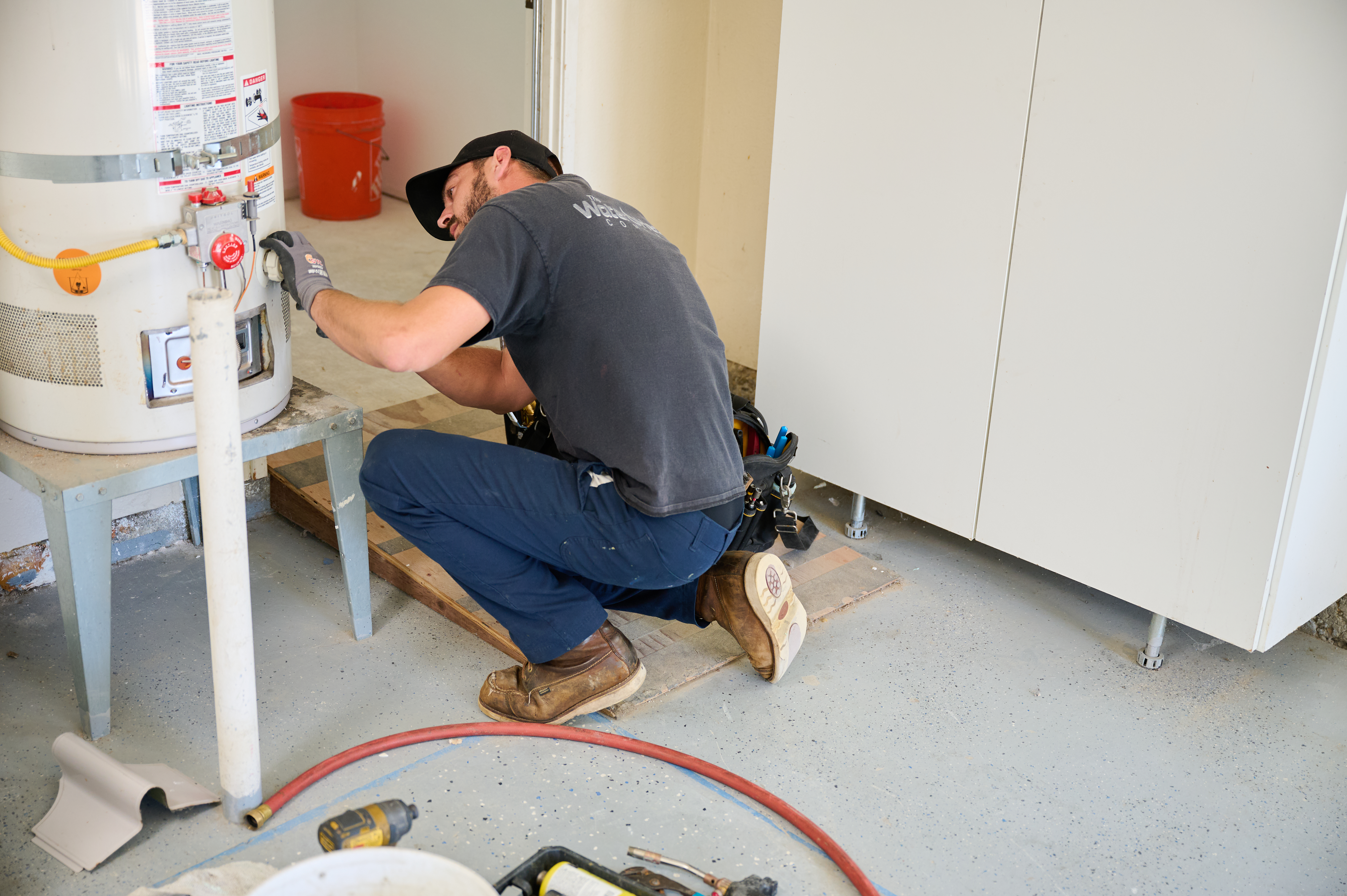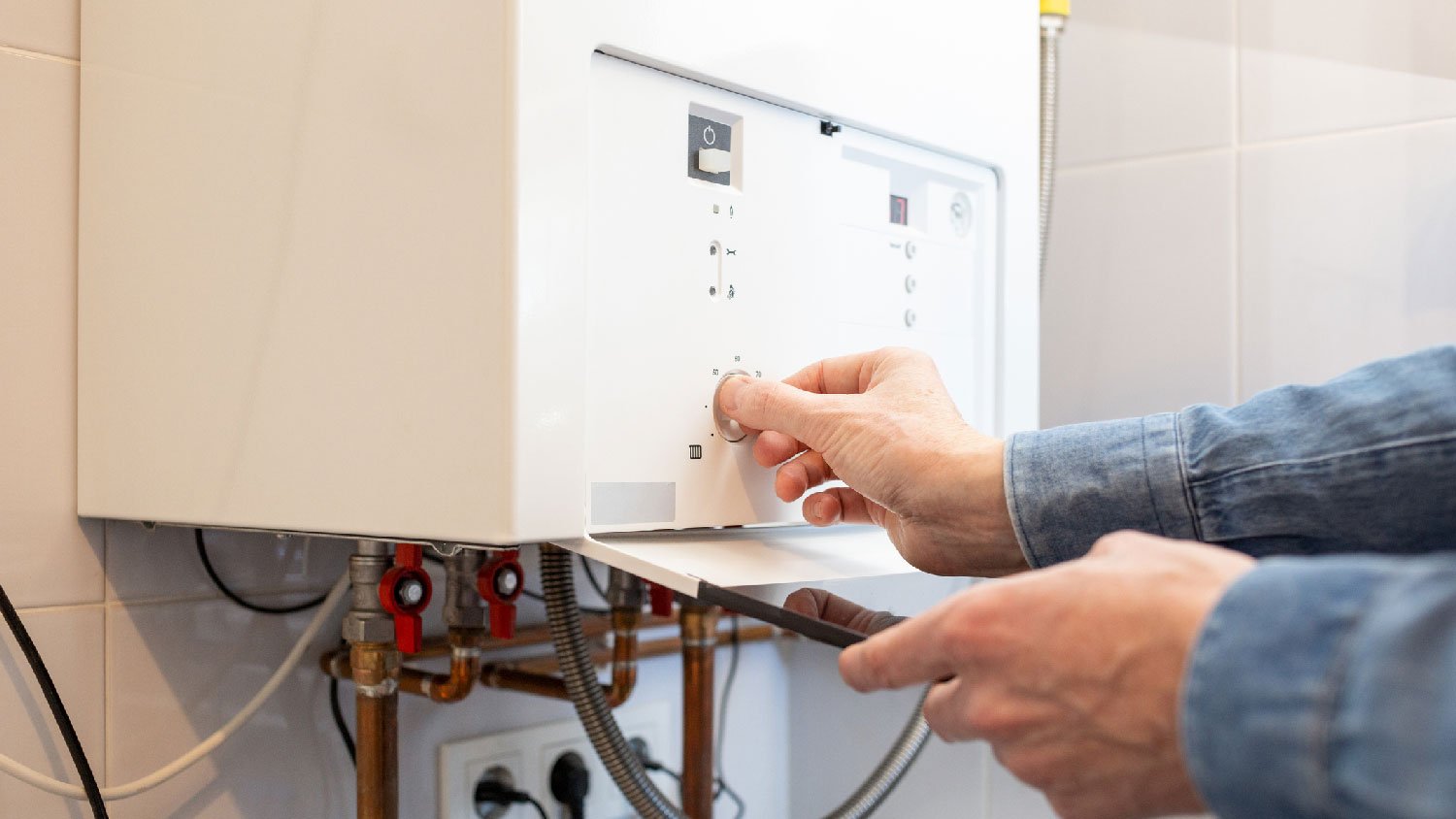
A water heater flush costs $160 on average but can vary based on the unit size, type, labor, location, and more. Keep reading to learn how much you could pay.
A frozen water heater can send a literal chill through your home


Water heaters can freeze due to power outages or the age and condition of the unit.
Repairing a water heater costs $550 on average.
Your unit may be frozen if you notice inconsistent hot water or leaks, or if your water heater won’t drain.
A plumber can fix the issue, and they’ll charge $180 to $480 per hour.
Insulating pipes, practicing preventative maintenance, and taking other precautions can prevent frozen water heaters.
The time of year when we rely most on warm water is also the time when our water heaters are most susceptible to freezing over. While not a common occurrence, frozen water heaters can occur when they lose power during outages or when they lack proper protection. Some simple steps can help you thaw your frozen water heater and protect it for the future.
Water heaters almost always have water flowing through them, so they rarely freeze. However, if your water heater is off when the temperature outside drops below 32 degrees Fahrenheit, it may freeze within a couple of hours. This typically happens during power outages when there is no heat running through your home to keep your plumbing warm.
Older heaters that can't run optimally may also freeze. Drastic temperature drops, power outages, or unmaintained pipes can all overload an older system and cause it to lose heat, eventually leading to a frozen water heater.
The cost to repair a hot water heater averages about $550, though it depends on what parts are damaged. Repairing a leaky pipe can cost $150 or more, and a burst pipe will cost $1,000 to $4,000 in repair and cleanup fees. The cost to install a replacement water heater is $750 to $5,200 depending on the type.

Before you start, it’s important to know what type of problem you're dealing with. If you’re having plumbing issues, it may be from a frozen water heater. Alternatively, you may need to find and thaw frozen pipes to solve the problem. Follow these steps to properly identify your winter woes.
With preventative water heater maintenance, you shouldn’t face many issues with your system throughout the year. So if you notice any of these signs, it’s likely that your water heater or plumbing may be frozen or close to freezing include:
Inconsistent or no hot water in your home
Damaged metal on the water heater
Leaks coming from water heater
Damp spots behind walls and ceilings
Drastic changes in energy bills during the winter
If you notice or suspect a leak in any part of your plumbing, call a plumber near you right away to come take a look.
If you suspect your water heater may be frozen, touch the outside of the unit with your hand until you locate a spot where it's ice cold. If you don't find such a spot on the tank or tankless unit, you may have ice in the pipes leading in and out of the unit rather than in the heater itself.
Water expands when it freezes, which may cause pipes to burst. This creates more problems once your plumbing thaws and water leaks everywhere.
Two signs of a burst pipe are weak faucet streams or loud gurgling sounds coming from your plumbing. Look for tiny cracks in the pipes leading in and out of your heater, and feel them to see if they're ice-cold. If you can't find cracks, look for damp spots throughout your home. As soon as you notice what looks like a burst pipe, shut off your water and call a local plumber.
If you've determined you don't have any leaking pipes, you may be able to thaw your plumbing on your own. If you notice or suspect a leak in your pipes at any point, make sure your water is off and call a plumber before the damage escalates.
It may be that your pipes have frozen rather than your entire water heater. If the frozen pipes are accessible, there are several ways to thaw them:
Turn up your thermostat
Set up a space heater near the pipes
Wrap a pipe heater around the pipes
Follow these steps to thaw a traditional tank water heater unit.
If defrosting pipes doesn’t get your water heater working, shut off the circuit breaker as well as the water and gas shut-off valves serving your heater.
Disconnect the tank and take it to an out-of-the-way part of your home, like a garage. This will protect appliances, floors, and other elements from water damage if your unit suddenly bursts while thawing. Skip this step if you don't have a safe space to drain the heater.
Set up a space heater to help speed up the thawing process. Avoid spot heating with devices like hair dryers, as these can damage your water heater.
Set a large tub or bucket under the small drain valve near the bottom of your tank to catch water as it starts to melt and drain. Then, open the valve.
Air needs to flow into the tank so water can flow out. Allow this by slowly opening the air release valve on your tank. You may also need to open the cold or hot water faucet.
Watch the tank carefully to ensure there are no breaks or leaks you didn't notice previously. Call a plumber if you discover any signs of damage, and wait to reconnect the tank or turn on your water until you speak to a pro.
Once your tank drains completely, check the intake and exhaust vents and clear any blockages. If they're clear, reconnect your tank and turn everything back on.
If your tankless hot water heater is frozen, the process is slightly simpler.
Close the water or gas shutoff valves and the circuit breaker serving the water heater.
Give the system time to thaw. Turn up your thermostat or set up a space heater to speed up the process. Set a large bucket below the unit and open the water supply valve to see if water flows.
Check the entire tankless unit, including its internal parts and the plumbing pipes around it, for signs of damage or leaking. If you see damage, don't turn on your water or power the system back on. Call a plumber right away.
If water is flowing normally and there is no other damage, open the water and gas supply valves and turn the electricity back on.
You can avoid serious winter plumbing problems with some relatively simple preventative measures. Use these tips to avoid a frozen water heater:
Insulate external pipes with polyethylene wraps, electric heat tape, or fiberglass.
Keep internal pipes warm by running your home's central heating system daily.
Have a decent battery backup for your water heater in case of outages.
Run a trickle of water during a power outage.
If you have a tank water heater, have it thoroughly inspected and cleaned before winter.
Insulate your tank water heater if its sticker displays an R-value under 24.
Place a sturdy cover on the intake and exhaust vents to block debris from entering.
Drain your heater during emergencies or before leaving your home for winter vacation.
If installing a new water heater, place it in a warmer part of your home.
Purchase a replacement heater with built-in ceramic freeze protection.
If the DIY thawing methods above don’t get your system back up and running, or if there are any visible cracks or leaks in your water heater or pipes, we recommend calling a plumber right away. Expect to pay $180 to $480 per hour for the cost of a plumbing work.
Some handy homeowners may be able to patch pinhole leaks in water pipes. However, issues resulting from frozen plumbing tend to be more complex and can lead to severe water damage if not dealt with properly and promptly. Instead, hire a local water heater repair company to inspect and resolve this type of issue.
If you are able to thaw out your frozen water heater, you should still consider calling a professional to check your handiwork. Water heaters have very little room inside the unit, and frozen water can often exacerbate any minor issues or even cause new ones.
While you may have mitigated the main issue for now, there could be other problems to address. A water heater repair company can check for any signs you may need a new water heater to give you much-needed peace of mind.
From average costs to expert advice, get all the answers you need to get your job done.

A water heater flush costs $160 on average but can vary based on the unit size, type, labor, location, and more. Keep reading to learn how much you could pay.

Running out of hot water too quickly or hearing strange noises when you call for hot water? Use this water heater repair cost guide to see what a fix will cost in Atlanta, GA.

Tankless water heater costs in Atlanta, GA depend on the size of your water heater, location, fuel type, and more. Keep reading to calculate your expenses.

If your water heater is leaking, you can still use water as long as you have a repair plan. Here’s what you need to know about a leaking water heater.

Gas water heater not lighting? There are a handful of reasons an issue like this happens, but most of the causes are simple and inexpensive to fix.

If your showers are lukewarm, you could have a water heater issue. This guide explains how to replace a water heater element to solve the problem.